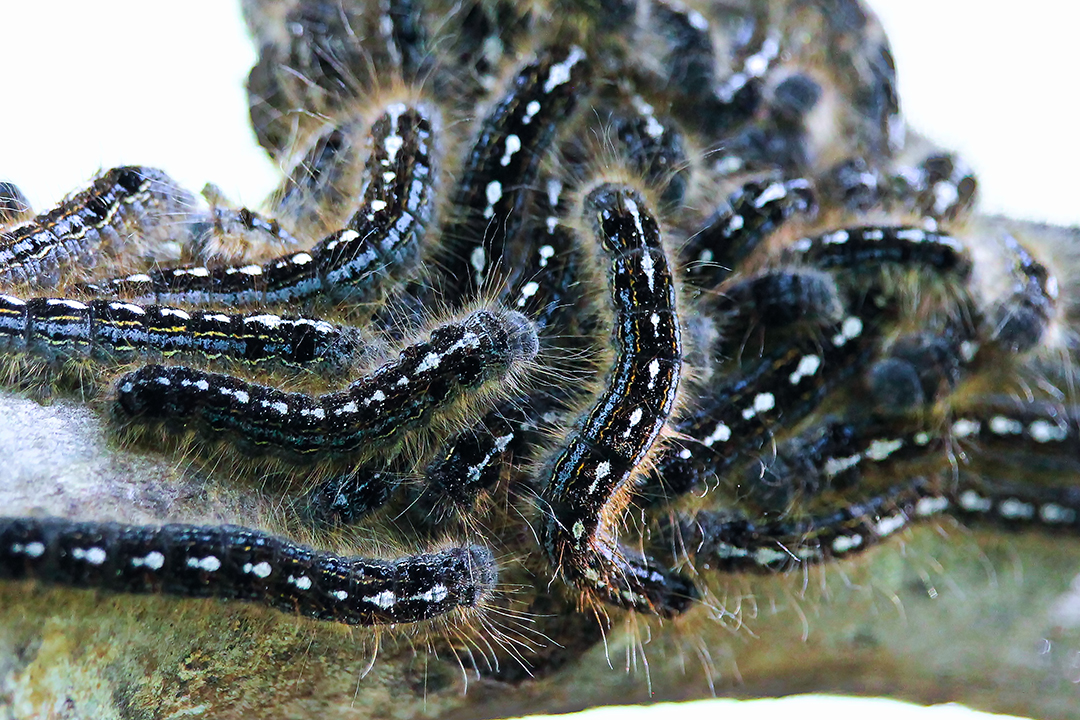
Cardiac cases linked to caterpillars
A report recently published in Canadian Veterinary Journal tells the story of how a team of veterinarians at the Western College of Veterinary Medicine (WCVM) linked cases of an uncommon cardiac disease in horses with a caterpillar infestation in Saskatchewan.
By Myrna MacDonaldBetween June and September 2017, clinicians at the WCVM Veterinary Medical Centre examined four horses of varying ages and from different locations in the province. Overall, the horses showed similar clinical signs including a lack of energy, rapid heart rate, muffled heart sounds, jugular vein distension, swelling of the lower abdomen and respiratory distress.
All of the animals were eventually diagnosed with congestive heart failure due to septic fibrinous pericarditis. Pericarditis is inflammation of the pericardium — the membrane that surrounds the heart. When fluid builds up in this sac, pressure on the heart reduces its ability to pump blood.
As the article’s authors state, this is the first report of a suspected association between an outbreak of forest tent caterpillars and equine fibrinous pericarditis in Western Canada. According to the horses’ owners, their pastures had been infested by forest tent caterpillars during the previous two years. Saskatchewan experienced larger outbreaks of the insects than usual in 2016 and 2017.
Veterinarians in United States and Australia have previously reported a link between tent caterpillars and equine disease. In 2001 and 2002, horses ingesting eastern tent caterpillars was associated with mare reproductive loss syndrome (MRLS) in Kentucky, Ohio and several other American states. While fibrinous pericarditis was associated with some of the U.S. cases, MRLS is mainly associated with a devastating number of abortions in pregnant mares at some large thoroughbred breeding farms.
The Saskatchewan cases shared similar clinical signs with MRLS horses diagnosed with pericarditis. The cases were also considered septic (infected with micro-organisms) based on bacterial culture results that found Actinobacillus species as well as Escherichia coli and Enterococcus faecalis. In previous cases where there was an increased build-up of septic fluid, 40 per cent of the pericarditis cases associated with caterpillar ingestion showed infection with the same bacteria.
Three of the horses were humanely euthanized after diagnosis, but one owner opted to treat the patient — an 18-year-old Appaloosa mare. To reduce pressure on the mare’s heart, the clinical team inserted a needle into the pericardium to withdraw fluid — a procedure called pericardiocentesis. In total, clinicians drained an astonishing 16 litres of fluid during the procedure.
In addition to intravenous fluids and an anti-inflammatory drug, the mare received antibiotics (penicillin and gentamicin) to treat Actinobacillus bacteria isolated from fluid collected in the pericardiocentesis. The horse was eventually discharged, but 11 days later, the animal showed clinical signs signalling a relapse of congestive heart failure.
The owner decided to euthanize the horse, and based on necropsy results, the relapse was attributed to an accumulation of thick, yellowish fibrinous material on the pericardium’s inner layer that likely caused a constrictive cardiomyopathy (heart disease). Fibrin is a fibrous protein that plays a critical role in the clotting of blood, and its presence was a common finding in post-mortem examinations of all four horses.
While the WCVM clinical team can’t definitively prove the connection between forest tent caterpillars and pericarditis, they do recommend that owners be aware of the potential risk and to prevent their horses from accidentally ingesting the insects during outbreaks. Compared to other parts of Canada and the U.S., outbreaks of forest tent caterpillars in Saskatchewan are unpredictable.
Reference: Chapuis RJJ, Ragno VM, Ariza CA, Movasseghi AR, Sayi S, Uehlinger FD, Montgomery JB. “Septic fibrinous pericarditis in four horses in Saskatchewan following an outbreak of forest tent caterpillars in 2017.” Canadian Veterinary Journal. 2020. 61:724-30.
